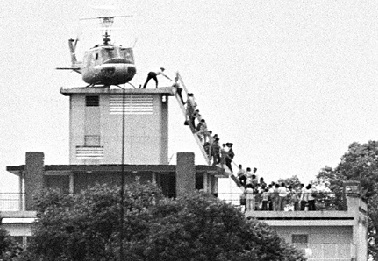Yesterday, April 30th, was the 40th anniversary of the fall of Saigon — now Ho Chi Minh City — and the end of the American participation in the Vietnam war. What’s clear in retrospect is that we had no idea what we were doing over there.
 Years ago, I read “Fire in the Lake,” the Pulitzer Prize winning history of Vietnam written by the journalist and historian Frances FitzGerald. From this long, and occasionally impenetrable book, I learned a great deal about why our mission over there was a complete folly, without any real possibility of success. In her tome FitzGerald argued that the American values of freedom, democracy and optimism were completely inconsistent with Vietnam’s values, culture, its agrarian existence, and especially their cultural tradition of ancestor worship. Ho Chi Minh was a revered figure in much of Vietnam, and it made no difference to the ordinary Vietnames that he was a communist, or what political philosophy he was ostensibly advocating for. In Vietnam Ho Chi Minh was looked upon as the “father of their country,” much as Georg Washington is over here.
Years ago, I read “Fire in the Lake,” the Pulitzer Prize winning history of Vietnam written by the journalist and historian Frances FitzGerald. From this long, and occasionally impenetrable book, I learned a great deal about why our mission over there was a complete folly, without any real possibility of success. In her tome FitzGerald argued that the American values of freedom, democracy and optimism were completely inconsistent with Vietnam’s values, culture, its agrarian existence, and especially their cultural tradition of ancestor worship. Ho Chi Minh was a revered figure in much of Vietnam, and it made no difference to the ordinary Vietnames that he was a communist, or what political philosophy he was ostensibly advocating for. In Vietnam Ho Chi Minh was looked upon as the “father of their country,” much as Georg Washington is over here.
Part of the reason for our being in Vietnam also had to do with the Domino Theory, first articulated by President Eisenhower, which was the belief that if we “let” a country go communist, the neighboring countries were sure to follow. That theory turned out to have about as much validity as the notion that we would be “welcomed as liberators” when we invaded Iraq.
 Of course, we haven’t learned much in the four decades since Vietnam. Our shenanigans in Iraq and adventures in Afghanistan have proven that. The latter country is a good case in point. Afghanistan is a country that kicked the ass of the Soviet Union, and has pretty much been kicking our ass since we invaded it back in 2011. Vietnam, that peasant country, first kicked the butts of the French, and then proved impervious to our efforts to dominate it. Oh yeah, we could “bomb it back into the stone age” — as U.S. Air Force General Curtis LeMay famously opined back in 1965 — but we couldn’t beat them in a war where we could not distinguish the Viet Cong from the rest of the population. We could recognize neither friend or foe.
Of course, we haven’t learned much in the four decades since Vietnam. Our shenanigans in Iraq and adventures in Afghanistan have proven that. The latter country is a good case in point. Afghanistan is a country that kicked the ass of the Soviet Union, and has pretty much been kicking our ass since we invaded it back in 2011. Vietnam, that peasant country, first kicked the butts of the French, and then proved impervious to our efforts to dominate it. Oh yeah, we could “bomb it back into the stone age” — as U.S. Air Force General Curtis LeMay famously opined back in 1965 — but we couldn’t beat them in a war where we could not distinguish the Viet Cong from the rest of the population. We could recognize neither friend or foe.
And who are we fighting against in Afghanistan? Oh yes, the Taliban. But who else? And can we distinguish the Taliban from other Afghanis? I think the answer is obvious. This war is just as unwinnable as the one in Vietnam, but we’re still afraid to admit it.

That was an interesting piece of American intervention in Asian socio-political affairs. I think its safe to assume that at any time any country gets involved in the affairs of another, it is out to either further or protect their own national interests. I seriously doubt anyone was convinced that America’s intervention in Vietnam, Afghanistan, Iraq or any other country was done in the spirit of compassion to help a weaker country, without a quid pro quo.
What I found amusing is the implication that the American presence in Vietnam was to diffuse the spread of communism, and that the invasion of Iraq was in the spirit of liberation from Saddamism (pardon the pun). Seriously? That was the idea playing around American foreign policy?
Unbelievable…mainly because a study of Iraq history would have told American policy makers that Iraq had never been a free country to begin with. Liberty was never taken from them so they can’t appreciate America’s gift of liberation. The obvious consequence to Iraq after the fall of Saddam is that they had no idea how to create, much less run, a government. The American government gave them freedom, they should have stuck around long enough to teach them what to do with it.
Excellent post~